COMMUNITY PROJECT SOLUTIONS FOR OFFGRID INDONESIA
SREG
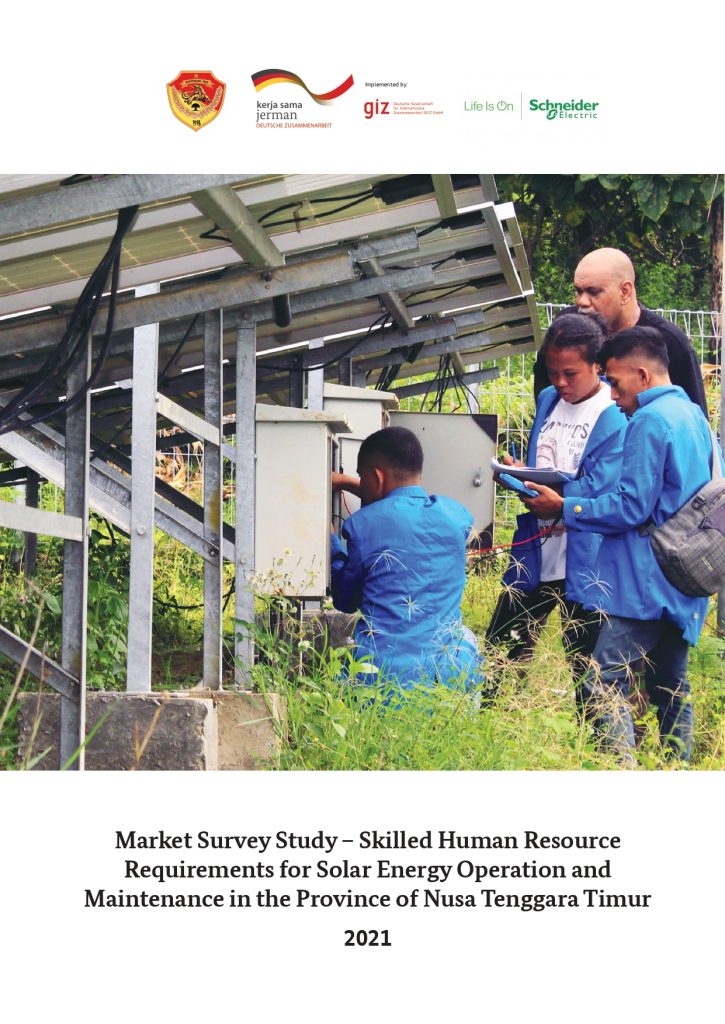
This solar Photovoltaic (PV) market survey study in Nusa Tenggara Timur (NTT) Province provides a full perspective of regulatory and planning aspects to support PV development, skill development, and supply chain. This report offers an understanding of how the regional government reacts to Indonesia’s renewable energy commitment and draws a link to their commitment to skill development programs to support green growth. Additionally, this report provides an outlook on the market conditions in the province from the private sector and association perspectives.
The report is built upon secondary data, information extracted from procurement databases, Key Informant Interview (KII), Focus Group Discussion (FGD) and in-house analysis. Findings are presented in three main parts which are current conditions of the solar PV sector in NTT, supply chain mapping and lastly, looking at future solar PV plans, estimating future labour demand and analysing skill-demand gap in the current vocational education. There are a few notably findings highlighted in this report, among them are:
- The PV projects in NTT, by quantity, is highly driven by the government initiatives with characteristics of being off-grid, small-scale in capacity ≤100 kWp and community-based management. The central government also has introduced solar rooftops in a few public infrastructures and provided other distributed solutions such as Solar Home System (SHS) and solar street. While rooftop users data are traceable, the last mentioned is hard to get. Moreover, in all projects, operators are trained on the spot and no certifications are provided. Apart from that, PLN and donors were also contributing, with PLN is starting to adopt PV mini-grid to reach
- The supply chain mapping indicates that NTT lacks installers and Operation and Maintenance (O&M) providers. Projects were mostly developed by companies from outside NTT and skilled labour was hired from outside. Project developers acknowledged the difficulties of accessing the information on PV professionals in NTT due to a lack of data. While PLN acknowledged that it is difficult to find professionals who are willing to be placed in remote areas.
- Discussion and interviews with local governments, solar PV developers, TVET institutions, solar PV users/customers and prospect customers strengthened the finding that with no O&M providers and installers in NTT, the adoption of PV will likely be delayed. This issue on the demand side is among other aspects mentioned by our survey respondents and interview informants such as lack of local regulation, incentives and low purchasing power. While on the supply of labour, some issues are related to human resource competencies (lecturers/teachers/instructors) that have not met the needs both internally in vocational education and for industrial needs, lack/inadequate link and match program developed between SMK/BLK and industries, lack/inadequate alumni tracing system.
- While there is a clear roadmap on achieving a 100% electrification ratio in the government and PLN documents, there is no clear strategy yet in place to prepare skills to ensure that local labour can actively take the benefit of those projects in the futur
In a nutshell, the study concludes that there is an open opportunity for solar PV job creation in NTT, and to showcase that NTT can become the lead on solar PV skills as its location is perfect for solar PV and there is an intention to make the province as the solar barn for Indonesia. However, to benefit from this, NTT needs a clear roadmap on skill development and support with local regulations to attract private sector investment.
full report at : https://onedrive.live.com/?authkey=%21AM0T9IF4Oklk13E&cid=552965BF75CCFF13&id=552965BF75CCFF13%21146&parId=552965BF75CCFF13%21142&o=OneUp
REWIRE will conduct surveys and workshops that will build local capacity in renewable energy technology on Sumba island in Ubu Oleta and Walakari Villages. Technology transfer will enable local communities to use local materials to install autonomous generation. The project promotes gender equity, ease of replicability, cultural exchange, climate adaptation, and Australian expertise.
Media release
17 November 2021
As part of Australia’s ongoing commitment to build strong people-to-people and institutional links with Indonesia, I am pleased to announce that 13 recipients will share in $460,000 through the 2021-22 Australia-Indonesia Institute grants program.
These grants will strengthen cooperation between our two countries in responding to the COVID-19 pandemic as part of our shared commitment to regional recovery.
We are happy to announce that our publication on the Ubu Oleta is now accessible from IEEE
Authors: Dedy J Haning, Erna Megawati Manna, Gus Firman
Publication date: 2021/9/24
Conference: 2021 IEEE International Power and Renewable Energy Conference (IPRECON)
Pages: 1-6
Publisher: IEEE
Description
While the Indonesian grid continues to expand toward off-grid communities, Sumba kept its unique challenge of scattered communities living between valleys and rolling hills, making the national grid expansion financially expensive. Hence, this condition is not unique to Sumba, but Indonesia in general. In this study, we investigate the need for clean energy for indigenous villages of the frontier, outermost and disadvantaged communities. We also provide the local community and government with sustainable photovoltaic management learning that is suitable for the village. We conducted a literature review, fieldwork, small group discussion with relevant stakeholders, and the development and implementation of photovoltaic. After the data were collected, it was coded in order to uniquely organize the file and for easy access to the data. The result shows that the community is willing to improve their livelihood through …
A full article at: https://ieeexplore.ieee.org/abstract/document/9640674
We are happy to announce that our proposal with Tim Frodsham from Murdoch University tittle REWIRE (Renewable Energy Workshops to Assist Indonesia’s Rural Electrification) has received full support from the Australian government.
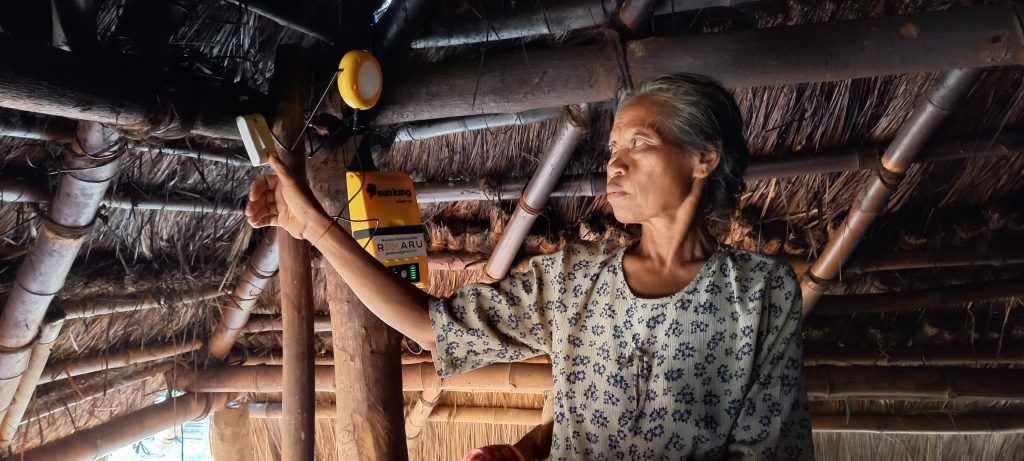
the COVID-19, many people in Sumba suffered from economic loss since the traditional markets are closing and restrictions on travel took place. This situation is worsening with the scarcity of fuel due to delays in logistics. For months, most communities are in the total dark.
The list of Kampung are:
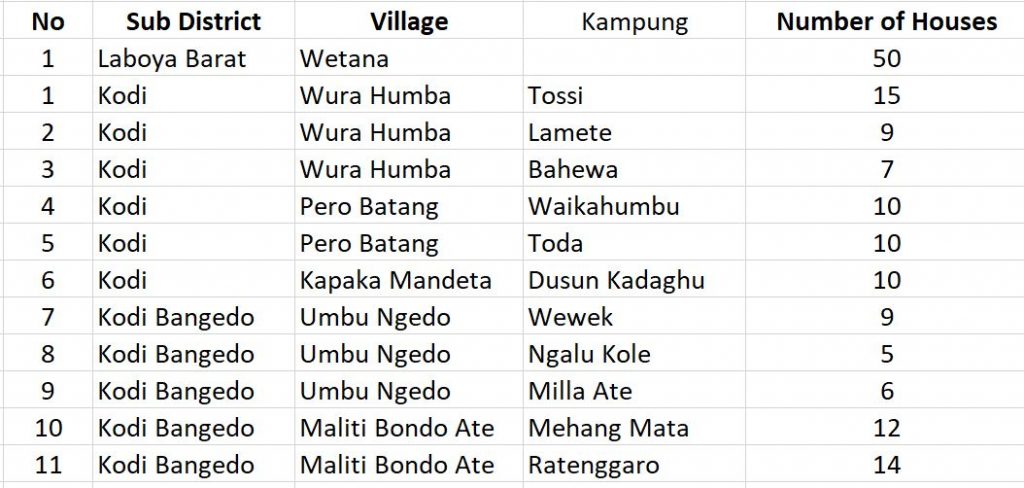
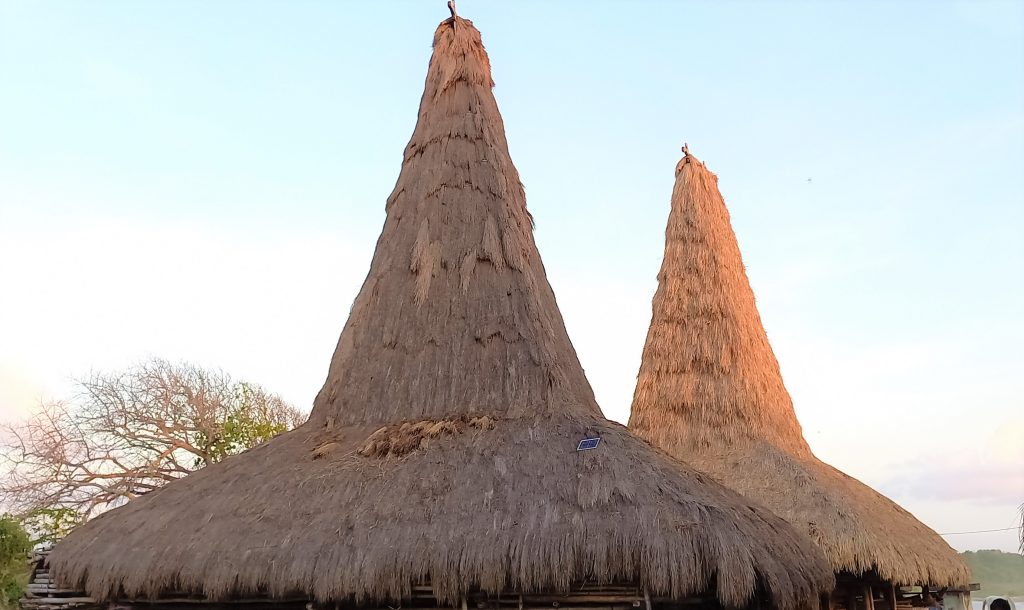
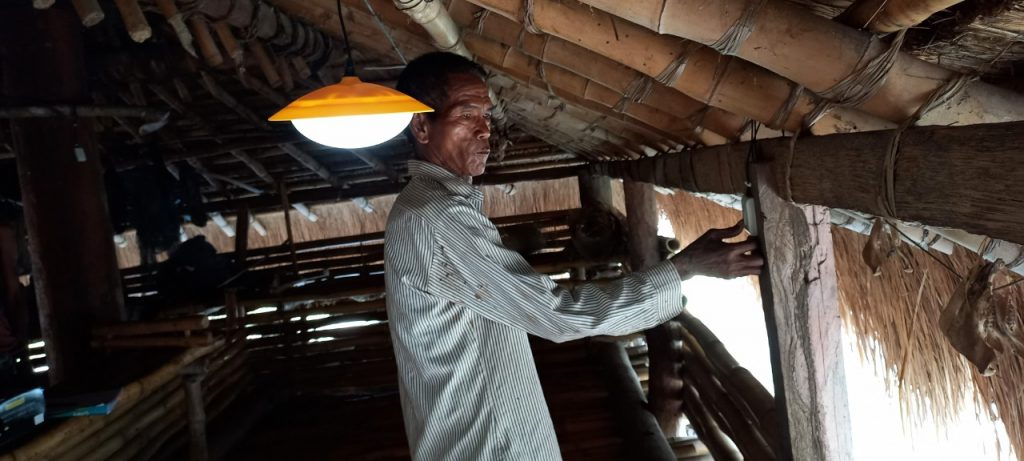
JOIN US TO BRING CLEAN ENERGY SOLUTIONS TO TRADITIONAL VILLAGE OF UBU OLETA IN WEST SUMBA, SUMBA ISLAND, INDONESIA
While the Indonesian grid continues to expand toward off-grid communities, Sumba kept its unique challenge of scattered communities living between valleys and rolling hills, making the national grid expansion financially expensive. These communities live in a typical compound called Kampung Adat, which retains its charm of the traditional vernacular houses, megalithic tombs, natured dyed weaving known as Ikat, and beautiful savannahs. Unfortunately, these hamlets are still difficult to access and vulnerable to fire hazards due to the use of kerosene lamps for lighting and burning firewood. This demonstration project aims to provide the local community and government with sustainable PV management learning. In doing this, we are working together with locally trained technicians in Sumba for procurement, installation, and Operation and Maintenances (O&M) to ensure optimum system lifetime and proper waste management.
Check out the village video here: https://www.youtube.com/watch?v=0lqOZl63uf8
Where is the project location?
Ubu Oleta is a small hamlet consisting of less than 40 families living near the edge of a beautiful cliff looking out to the ocean. Located 50 km away from the district’s capital of West Sumba. The majority of people here rely on the cultivation of agricultural products and herding. Despite being a small closed related hamlet, traditionally this humble hamlet has a significant role in the customary system in this region as the gatekeeper to some important customary festive such as Pasola, an ancient war ritual showcasing Sumbanese men riding colourful decorated selected horses fling wooden spears at each other. This cultural richness has a huge potential to contribute to building a strong tourism sector and source of the economy if managed well. Google coordinates for the village -9.740833, 119.238333

Access to energy
This hamlet has located ±10 km from the national grid, and due to a small number of houses, it is less likely to be connected to the grid in the near future. Currently, families here spend more than AUD$3 every month for kerosene to light their lanterns; while cooking is mainly relying on firewood. Women and young girls are responsible to collect wood and ensure the lights are on in the house. Another big expense apart from energy is clean water. Currently, their options are either to fetch water from small natural spring water located not too far from the village or to buy water for AUD$ 150 per 5,000 litres.
Technology and business model
We propose a microgrid DC system that can connect up to 3 houses clustered together. With the current setting of the village Ubu Oleta, we will need at least three systems like this. However, this pilot project will seek funding to start with one system and extend it as the awareness of clean energy increases. A PAYGO system will be offered to the remaining houses. Each house in this pilot will have 3 lights as a basic package and a fan or television as a premium package. Installation and O&M will be done by local technicians. The community will have to pay a basic O&M service of AUD$2,5 monthly/house.
About Solutions for Renewable Energy Group Offgrid (SREG)
SREG is established by three Australian Alumni
- Dedy Haning, Director of PT RAKARU
- Erna Megawati Manna, working with local government (Regional Planning, Research and Development Board of Southwest Sumba) will responsible for training operation to the local community and engage local government to introduce them to the overall concept and technology, including engaging tourism board
- Gus Firman, working with Hivos, an international non-goverment organization working in Sumba Iconic Island project will contribute to monitoring and evaluations, and gender mainstreaming training to the community.
The team members are the recipient scholarship for Renewable Energy Technologies in Eastern Indonesia 2019, brought by Australia Awards Indonesia and Murdoch University

Catch up with the project’s progress at Social Media
https://www.instagram.com/solutions4offgrid
email: solarprojectsumba@gmail.com